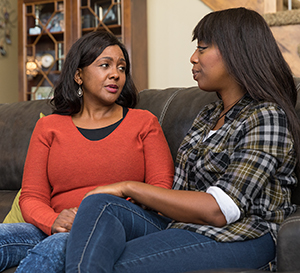Alcohol Use Disorder (AUD): How to Be Part of the Solution
You can play a part in helping your loved one stop drinking. It may mean changing some of your own behavior. This can help your loved one with recovery. Read below to learn more.
Being part of the problem
Enabling
People with alcohol use disorder often involve friends and family in their drinking. You may hear AUD called alcoholism. People with AUD may use others to make excuses for them. They may repeatedly rely on loved ones to rescue them and take care of them. Assisting someone with alcohol use disorder can support their drinking. It is called enabling. You may be doing this without even knowing it.
Letting it harm your own life
When you try to care for a loved one with AUD, it can be hard to live a normal life. This can be bad for your own mental health. It can also be harmful for children in the family.
Getting nowhere
By recognizing ways you may be enabling unhealthy drinking behaviors in your loved one, you can try to transition from enabler to being part of the solution.
Being part of the solution
Don’t enable
You need to end the support that enables your loved one to drink. A good way to start is by letting your loved one know and understand the effects of their drinking. This can help them face reality. Encourage them to reduce or stop drinking. Also encourage them to get treatment, and to keep taking medicine that may be prescribed for their alcohol use disorder.

Focus on your own needs
Stop letting your thoughts and actions be ruled by concerns about your loved one with AUD. You can then be free from that person’s illness. Start taking care of your own needs first. Then you can take steps toward a more normal life. This is a very difficult situation. Don't hesitate to seek help from mental health professionals to help you deal with your feelings and find new ways to respond to your loved one.
Get help
You can't help someone overcome their AUD alone. There is help for those who can accept it. Learning how to deal with the disease may mean new ways of thinking. It may mean learning new behaviors. Getting guidance and support from others can be very helpful. Many people find family therapy or support groups helpful. There are support groups for both partners and children of people with alcohol use disorder. Ask your healthcare provider for a list of resources.